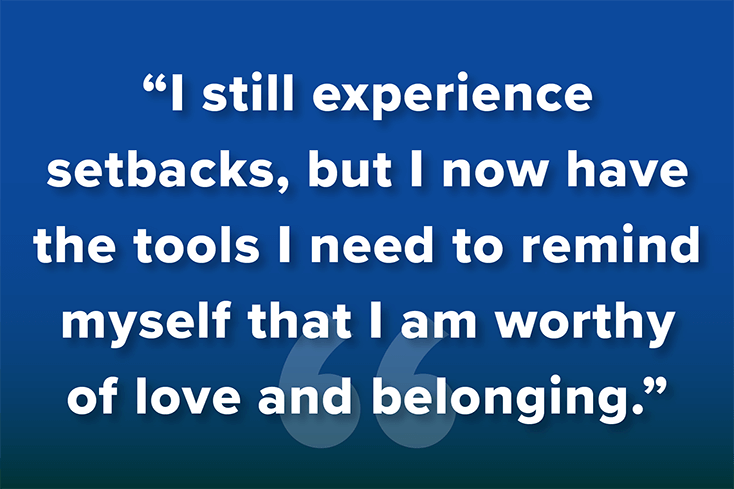July 21, 2022
By Kaya Wimmer

My mental health struggle began when I was diagnosed with epilepsy at age nine. Epilepsy is (perhaps understandably) considered to be a disability, but the effects being labeled “disabled” at such an early age changed my life. I was immediately treated differently. Growing up as a Latina on the Navajo reservation already separated me from everyone else — and adding a disability that few people had heard of only expanded the gap. Because of this isolation, I was miserable.
I began seeing a therapist in the third grade who diagnosed with me everything from autism to depression. Although I was receiving help, none of these diagnoses ever felt like they explained my story. My emotions were always out of control; The tiniest obstacle would send me into a violent rage. My parents would often call me a drama queen. This isolated me even further. I felt like a weird, overly emotional, disabled kid who didn’t belong anywhere. The message was clear: there’s something so wrong with you that no one can fix it and it’s your fault. And I believed it.
When I reached middle school, I began experiencing suicidal thoughts. By the time I was 13, I had attempted suicide four times and frequently self-harmed. After my fourth suicide attempt, my parents sent me to an inpatient treatment facility. The facility was understaffed, and it felt impersonal. I was given a medication that can lower one’s threshold for seizures, so I was having them nightly. There, I was diagnosed as bipolar and given antipsychotics.
After my inpatient stay, my family moved to Flagstaff, where I attended high school and community college. I was happier, but I still didn’t belong. It seemed as if I was “too Mexican” for my white peers and “not Mexican enough” for my Mexican peers. Even in a new environment, I was still labeled as too emotional and disabled. Then, I started having panic attacks. These new struggles were then compounded by the unexpected death of my therapist.
Things began to turn around when I started meeting with a new therapist. I began talking about the things that I had avoided for so many years before. I talked about my panic attacks, my inability to practice vulnerability, the effects of my parents’ dismissal, the isolation I felt throughout my childhood and how separated from everybody I always felt. I was making progress as she provided compassionate, nonjudgmental guidance.
All progress has setbacks, however. When I was 19, after the pandemic began, I was working a job I liked with people I liked, and I was closer with my family than ever before. So, I stopped going to therapy. That’s when I started drinking. It started out small but got to a point where I was missing work. I sought help from a psychiatrist and was diagnosed with borderline personality disorder — a label that finally gave me clarity. This diagnosis made complete sense. I was devasted but unbelievably relieved. I broke down realizing I wasn’t alone, and I wasn’t “crazy.”
This discovery saved my life because I was no longer just a drama queen or overemotional outcast. There was reasoning and science behind my feelings and actions. I still experience setbacks, but I now have the tools I need to remind myself that I am worthy of love and belonging. I plan on providing the same help I was lucky enough to receive to others by becoming a licensed therapist. I want to tell those who are struggling the same thing that saved me: you are not alone, and you are not “crazy.” You are worthy of unconditional love and belonging.
Submit To The NAMI Blog
We’re always accepting submissions to the NAMI Blog! We feature the latest research, stories of recovery, ways to end stigma and strategies for living well with mental illness. Most importantly: We feature your voices.
LEARN MORE